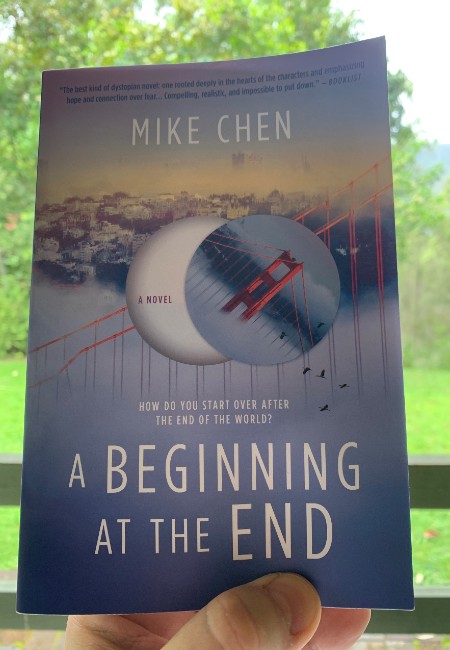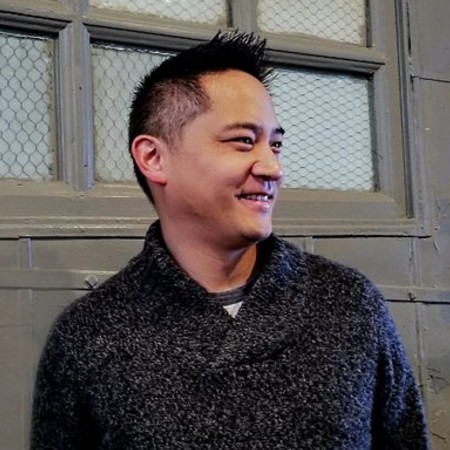“The end of the world” is one of those soul darkening phrases that sounds definitively, irrevocably, irreparably final.
But what if the end of the world wasn’t so much an end, though in many ways it is, but simply a “pause”? What might that be that like?
In The Beginning at the End, Mike Chen wonders what might be left after a civilisation-crushing flu-like pandemic rages across the world, leaving five billion people dead, precious bonds between friends and family rent forever asunder and countries in a state of peace, law and order distorting disarray.
Is there really any coming back from that? Or is it too much for what’s left of society to handle?
Certainly things haven’t sprung to anything approaching the old normal.
Many parts of cities such as San Francisco, where much of the novel is set, are no-go zones, either slated for eventual renewal or demolition, mask wearing is all but mandatory and many people, most survivors really, have what is called Post-Apocalyptic Stress Disorder (PASD), either refusing to leave their homes or begging reluctant to engage too fully with anyone else if they do.
“New survey shows stability, not love, highest priority in marriages.
One simple sentence. And yet, it struck Rob with the weight of death—not five billion deaths, but a single one. He blinked back tears, the feel of Elena’s limp hand an everlasting shadow on his own. Stability instead of love. Before everything, romantics would have scoffed. These days, stability seemed like a luxury, if both were impossible.” (P. 23)
This is good news for Krista Deal, a woman who makes her precariously balanced living do all the things that a great many people no longer want to do.
Such as getting wedding forms from City Hall – the world has largely gone old tech with the internet a shadow of its former self and paper trails once again an actual physical thing – or running errands or planning big events which require, in a world with precious few online options now, someone to front up in person to get the job done.
Krista looks like a smart, together, professional woman, but like everyone in this vastly depopulated, broken world, she is hanging on by a thread, always close to losing her Residency License (to live in the Metro areas, as they have been deemed, she must pay a fee; for those who hate the idea of that or can’t afford, there are the Reclaimed Territories where people repurpose now disused infrastructure to establish a commune or town … or cult) and unwilling to deal with some pretty intense past personal pain.
Ditto Rob Donelly, father to seven-year-old daughter Sunny, who is back at work at Podstar Technologies, housed in one of the few operational skyscrapers left in downtown San Francisco, but who is keeping a whopper of secret that has the power to undo everything he has built following the death of his wife Elena in one of the quarantine camps that played a key role in saving millions of people as the virus raged six years earlier.
Finally, there is Moira Gorman, soon to marry Frank (an oddity in a world of wrecked families and shattered social networks, his whole immediate family have somehow escaped unscathed as have a number of close friends) who is doing her best to pretend her past never happened, a fragile strategy that looks like unraveling as her father, from whom she is most definitely estranged, launches a worldwide search to find her.
That might all sound like a lot of brokenness and hurt, and truthfully, these four people are all manifestations of what follows the terror and hellishness unbuilding of society at the hands of the pandemic, but Chen manages to infuse The Beginning of the End with the kind of sparkling unexpected hope that manages to give Peng Shepherd’s The Book of M and Station Eleven by Emily St John such powerful affecting resonance.
For Rob & Sunny, Krista and Moira actually end up connecting in a world that seems inimical to that happening in any substantial way, finding out in the process that perhaps there is something to be gained, something life-changingly wonderful, from daring to connect with another human being.
This brilliantly-realised story is part of a growing trend, and one that is sorely needed amidst the horrific destruction of COVID-19, that says humanity is actually capable of coming back from terrible events that you could reasonably assume might simply end it.
Certainly many apocalyptic properties such as The Walking Dead rise and fall on the idea that the end is indeed the end, and that there is no coming back from such a cataclysmic event such as zombie apocalypse or in the case of The Beginning of the End, a virulent flu-like sickness that seems disinclined to leave too many survivors behind.
But Chen reasons, and reasons with real empathy and understanding of the human condition, that you can be hopeful even at the end of the world; sure, there’s a great deal of trauma and pain to navigate but navigate it you, and society, can and who knows what be waiting when all that’s done, or at least, on the way to being done?
“City Hall wasn’t exactly the most impressive place in San Francisco, even after the End of the World and subsequent reconstruction. Clearly, Sunny had never seen anything quite like the building’s central hallway, with it’s sprawling central staircase and domed ceiling. The place supposedly suffered significant damage during the quarantine period, but from the look of it, it had been restored exactly the way Krista remembered it when visiting the Bay Area as a thirteen-year-old. During that visit, she didn’t quite have the wide-eyed stare that was on Sunny’s face, though it did trigger a mix of emotions in her. For every happy memory of being able to breath easy, an entire country apart from her mom, there also remained the complication of protective lying every time her grandparents asked her how she was doing.” (P. 147)
We don’t find out straight away since a new wave of the pandemic comes sweeping in just as Rob & Sunny, Krista and Moira are finally making slow but successful headway into possible new lives, both separately and together, but even in the midst of the panic that follows the panic the announcement of fresh fatalities across the US and the world, we see the glimmers of what might come to pass.
Because for all the horrors it could portend, the second wave of the pandemic offers all four people a chance to come together in a way they might not otherwise have managed, changing everything for the better in a world that seems to have developed a killer predilection for the very worst.
There is nothing fairytale-ish or unrealistic about Chen’s post-pandemic world; people have suffered in catastrophically awful ways and there is no magic wand to wave that will suddenly make it all better with no scars left behind.
So people like Rob & Sunny, Krista and Moira have to earn their happy-ever-after, and earn it they do, in a novel that believes, celebrates and argues unceasingly, despite all the hope-crushingly terrifying evidence to the contrary, that there is a chance for new beginnings, rich, wonderful and heartfelt new beginnings even at the end of the world.
If you don’t think that’s possible, then you need to read The Beginning at the End, which is frank about nasty and brutal the world can be but which dares, successfully, to argue that hope is not a fool’s errand in ways that will inspire you, tug at your heart and remind that humanity’s capacity for coming back from the brink is unparalleled, especially when you have people with whom to share the perilous journey back to life in all its connected, supportive and loving glory.

